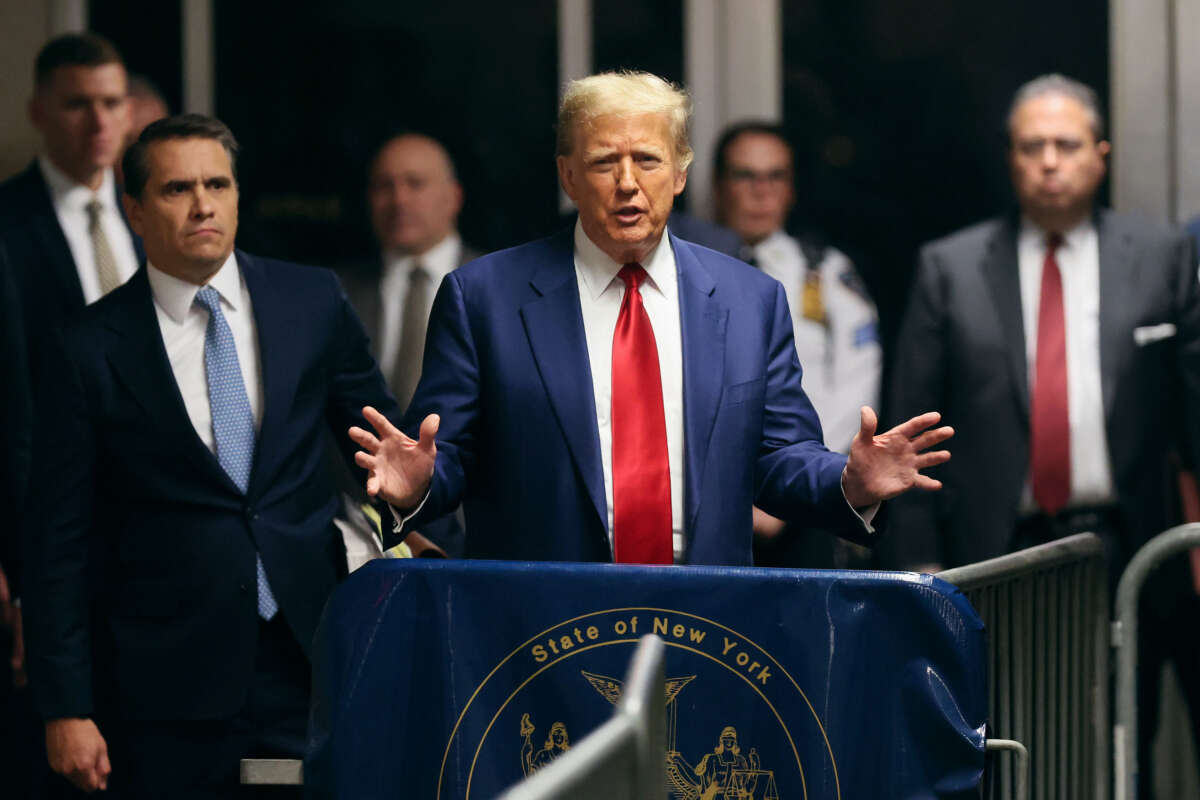A New York state appellate court judge has rejected a request from former President Donald Trump to delay his “hush money” trial that is set to begin next week.
The trial centers on Trump’s attempts to hide payments he made to adult film actress Stormy Daniels. According to the Manhattan District Attorney’s office, Trump made these payments through his former “fixer” lawyer Michael Cohen, who was then reimbursed by the Trump Organization through the falsifying of business records to conceal his extramarital affair with Daniels prior to the 2016 presidential election.
Trump faces 34 counts of falsifying records, with the maximum penalty of four years in prison for each count if he’s found guilty, although prison time isn’t always the outcome of these kinds of cases.
On Monday, a hearing was held before appellate division Justice Lizbeth González, after Trump’s lawyers brought up a motion to delay the trial, claiming that the proceedings had to be moved out of the city of New York because “an impartial jury cannot be selected right now based on prejudicial pretrial publicity.”
González rejected the argument, issuing a ruling with no explicit explanation attached to it.
The rejection doesn’t mean that the demand to move the trial elsewhere won’t be reconsidered, only that the trial will not be delayed on account of such a request. However, given that the trial is set to commence next week, with jury selection to begin right away, it’s unlikely that serious consideration of the demand will be entertained by this or any other appellate court in New York.
During the hearing, the District Attorney’s office pointed out that Trump’s complaints that pre-trial publicity could affect the outcome of the case were improper — indeed, Steven Wu, a lawyer for the DA’s office, noted that Trump was “trying to have it both ways” by simultaneously complaining about publicity while also seemingly relishing in it, as the former president has held numerous press conferences before and after pre-trial hearings, and discusses the trial regularly in online rants and at campaign rallies.
Also on Monday, Trump’s lawyers filed a lawsuit against Judge Juan Merchan, the judge overseeing the hush money case, regarding a gag order that was placed on the GOP candidate for president, limiting how he can discuss potential witnesses in the case and other court officials and their families. Trump has frequently claimed, without evidence, that Merchan is biased against him. The arguments in that lawsuit are under seal, and thus not available to the public.
It’s unlikely that that lawsuit will move forward, as it is an unusual and extraordinary route to sue a judge presiding over a case in order to change an order they’ve made in their courtroom. On Tuesday, a different judge denied the adjoining request to have the lawsuit delay the trial until the matter is settled.
If no other delays come about, the trial will begin on April 15, with jury selection to commence at that time. According to the jury questionnaire, potential jurors will not be asked to divulge if they are supportive of any specific political party, although they will be asked about their feelings regarding multiple political groups.
Jurors will have to provide, for example, their opinions on QAnon, a pro-Trump web of conspiracy theories that allege he’s fighting a secret war against a corrupt cabal of Democratic figures trying to influence society. The jury pool will also have to give their opinions on the Proud Boys, Oath Keepers, Three Percenters and Boogaloo Boys, far right extremist groups that are supportive of Trump.
The questionnaire also includes a question about jurors’ views on antifa, a loosely connected movement of anti-fascist individuals across the country. Trump and his followers have pushed unfounded claims about the antifa movement, including falsely alleging that they prompted the violence at the U.S. Capitol on January 6, 2021, when in fact the attackers were Trump loyalists.
Our most important fundraising appeal of the year
December is the most critical time of year for Truthout, because our nonprofit news is funded almost entirely by individual donations from readers like you. So before you navigate away, we ask that you take just a second to support Truthout with a tax-deductible donation.
This year is a little different. We are up against a far-reaching, wide-scale attack on press freedom coming from the Trump administration. 2025 was a year of frightening censorship, news industry corporate consolidation, and worsening financial conditions for progressive nonprofits across the board.
We can only resist Trump’s agenda by cultivating a strong base of support. The right-wing mediasphere is funded comfortably by billionaire owners and venture capitalist philanthropists. At Truthout, we have you.
We’ve set an ambitious target for our year-end campaign — a goal of $250,000 to keep up our fight against authoritarianism in 2026. Please take a meaningful action in this fight: make a one-time or monthly donation to Truthout before December 31. If you have the means, please dig deep.
